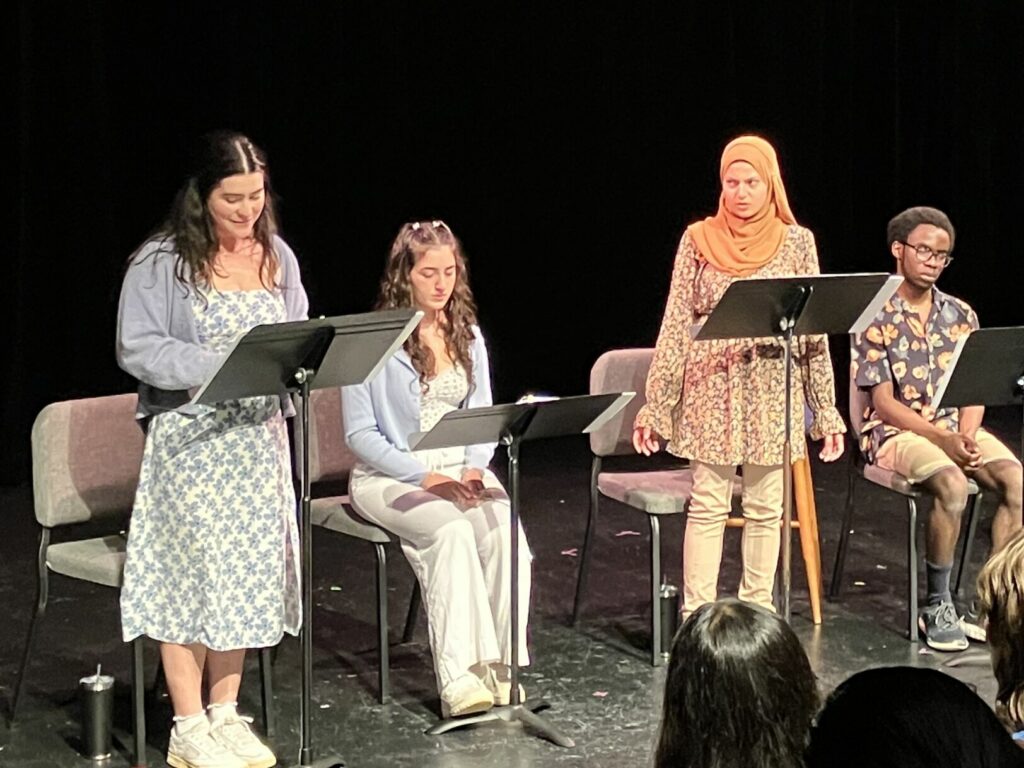 (Alexandra Kauffman / Arts & Life Editor)
(Alexandra Kauffman / Arts & Life Editor)
This year’s installment of “Brave New Works,” a biennial theater festival hosted by Theater Emory, featured staged readings of two plays that both explored themes of ecological crisis and humanity. “Felicity” by Dylan Malloy (23Ox, 25B), performed on Feb. 24, is a one-act play in which two teenagers argue over their ideological differences as they watch the launch of a rocket intended to colonize Mars. “The Boy Who Rode the Clouds” by Adam Weisman (22C) follows the story of a boy who single-handedly attempts to save the planet with his magical ocarina as well as the story of the girl who wants to help him. While “Felicity” explores themes of climate crises through a dystopian future and a stratified class hierarchy, “The Boy Who Rode the Clouds” brings a more whimsical approach to similar themes.
“Felicity” proved to be politically nuanced in its demonstration of two different ways class frustration manifests: despising versus coveting status. June, played by Emory MacLaughlin (24C) is pessimistic and pragmatic while Will, played by Nate Cohen (27C), is idealistic and juvenile. June despises the rocket because she thinks the billionaires aboard do not “deserve” a life of luxury, whereas Will admires their achievements and hopes to one day be able to escape Earth. I appreciated the intricacies of this dynamic, as though June is critical and Will is awestruck. They both ultimately envy the upper class, as they wish they could be the ones aboard the rocket. June sublimates her envy into anger, and Will sublimates his into hope.
These differences in character were communicated through Cohen’s and MacLaughlin’s brilliant performances. I felt like I could see the stars sparkle in Cohen’s eyes as he raved about the technological features of the Mars colony or delivered lines about wanting his own customized space helmet. MacLaughlin’s performance brought emotional resonance, as her face shifted through a menagerie of micro-expressions throughout the performance, demonstrating June’s anger, frustration, despair and love for Will.
The play’s ending was heart-rending and bittersweet. Will stood with his arm around June as she listed the experiences she loved on Earth while they watched the rocket successfully launch. After their prior conflict, the moment of connection brought much-needed levity to the end of the play. Despite the emotional development, nothing changed about June and Will’s material conditions. This created sinister overtones, as Will and June are ultimately helpless and cannot change their class status — they will never be able to escape Earth for a luxurious life on Mars. They have each other, and that is truly it.
Intended for young audiences, “The Boy Who Rode the Clouds” follows a girl as she is whimsically whisked away to live in the clouds, where she meets a pensive young boy. In addition to themes of climate disaster, the play explores emotional responsibility and burnout. The boy feels single-handedly responsible for the state of the planet, and the girl feels responsible for his well-being. The play ends when they agree to help shoulder each other’s emotional burdens.
The play’s magical elements, however, made it difficult to comprehend at times. The script contains as many, if not more, stage directions than dialogue. The actors often read their own stage directions, such as the two cloud characters who have very few lines of dialogue. These stage directions often paint rich images of epic scenes, but because this was a staged reading, the splendor of those images did not create a full emotional effect. However, the clever use of sound design helped remedy the gaps in performance. For example, whenever the young cloud and old cloud read their stage directions, they were accompanied by chimes from an on-stage triangle.
The actors’ performances further bolstered the script. Salaam Awad (27C), who played the girl, delivered every line with energy and excitement. Andreanna Kitas (26C) gave a similarly enthusiastic performance as the mischievous, loveable young cloud, while Emi Fernandez (24C), who played the older cloud, acted as a counterbalance with a more grounded, serene performance. Space Lutterodt-Clottey (27C) presented the character arc of the boy brilliantly, starting the play as serious and solemn while becoming more exuberant after healing.
While I appreciate the whimsical nature of “The Boy Who Rode the Clouds,” I found its message to be facile. If I were a child instead of a jaded 20-year-old, I probably would have been enraptured by this play and genuinely moved by its message. However, as an adult, I was entertained rather than genuinely emotionally compelled.
Although both Malloy and Weisman commented on social and political issues, I found Malloy’s play to be more nuanced and intellectually engaging through its portrayal of class. Weisman’s play had a strong emotional message I could imagine resonating with younger viewers, but “Felicity” offered a complex contemplation of political and social issues with a more realistic, though unhappy ending. Nonetheless, I appreciate that “Brave New Works” included two plays that differed so dramatically in tone and content, offering two unique creative visions from two talented playwrights.

Alex Kauffman (they/them) (26C) is majoring in English & Creative Writing and Film & Media Studies. They were born and raised in Phoenix, Arizona. At the Wheel, they have been an Arts & Life campus desk and section editor, and they are currently a senior staff writer. Outside of the Wheel, Alex is a Media and Entertainment Pathways Scholar and a tutor at the Emory Writing Center. In their free time, Alex is an avid movie watcher and iced latte consumer.





